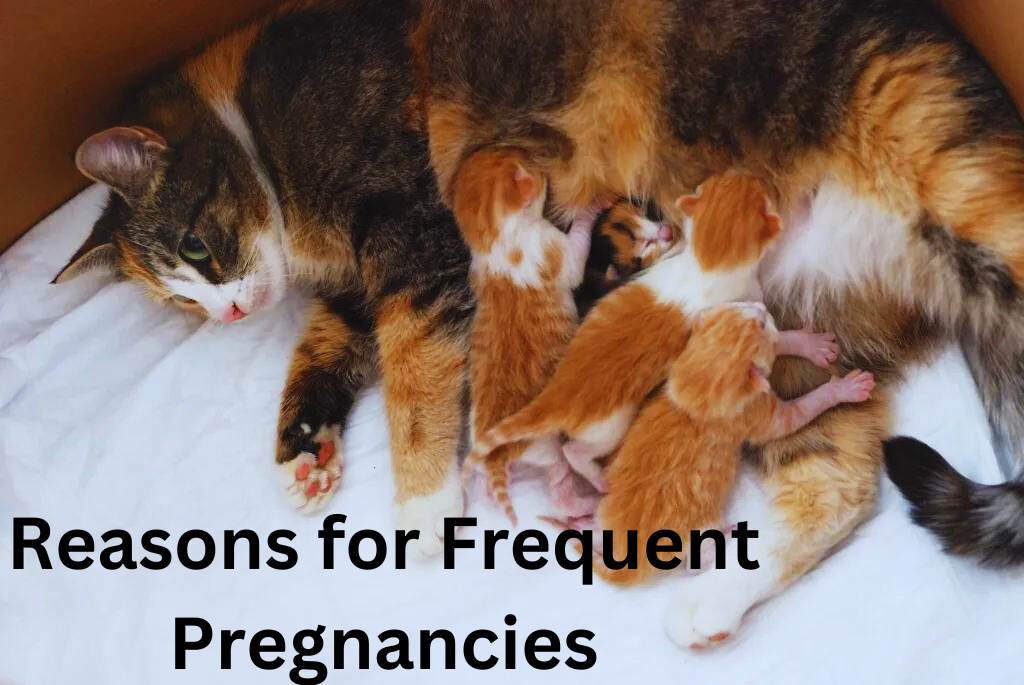Introduction
Are you puzzled by the mysterious arrival of a new litter of kittens in your household, despite taking every precaution to prevent it?
If so, you’re not alone. Many cat owners find themselves scratching their heads as they watch their feline companions repeatedly bring forth bundles of joy without an apparent explanation.
The phenomenon of cats seemingly defying all odds and continuously producing litters raises questions about their reproductive capabilities and behaviors.
In this article, we delve into the intriguing world of cat reproduction to uncover the truth behind why your furry friend keeps bringing kittens into your life. Is Your Cat Keep Bringing Kittens?
The Surprising Behavior of Cats
Understanding cat reproduction is essential for any cat owner, especially when faced with the surprise of frequent kitten births.
One reason for this phenomenon could be that the cat has not been spayed or neutered. Reproductive instincts in cats are strong, and if left unaltered, they will continue to mate and reproduce.
Additionally, certain breeds of cats may have a predisposition to more frequent fertility cycles, leading to multiple litters in a shorter time frame.
Another factor to consider is the presence of unaltered male cats in the vicinity.
Even if a female cat has been spayed, neighboring unneutered males can still trigger hormonal changes that affect her reproductive cycle.
This is why it’s crucial for both male and female cats to spayed or neutered to avoid unwanted pregnancies and excessive breeding.
By understanding these factors influencing cat reproduction, owners can take proactive steps to prevent unnecessary litters and promote responsible pet ownership. Is Your Cat Keep Bringing Kittens?
Understanding Cat Reproduction
Frequent pregnancies in cats can be a result of various factors, such as mating behavior and the natural breeding cycle.
Female cats are induced ovulators, which means they ovulate in response to mating, leading to frequent pregnancies if they have access to unneutered male cats.
Additionally, outdoor or feral cats may experience more frequent pregnancies due to increased opportunities for mating.
Furthermore, certain breeds of cats may be predisposed to frequent pregnancies due to their genetic makeup.
For instance, some breeds known for being prolific breeders and may have more litters compared to other breeds.
Environmental factors such as abundant food supply and shelter can also contribute to increased breeding frequency in cats.
By understanding the reasons behind frequent feline pregnancies, cat owners can take proactive steps to prevent unplanned litters and promote responsible pet ownership.
Reasons for Frequent Pregnancies
One of the most effective ways to prevent unwanted litters is by having your cat spayed or neutered.
This not only helps control the pet overpopulation problem but also offers numerous health benefits for your feline friend.
Spaying or neutering can reduce the risk of certain cancers and behavioral issues, making it a win-win situation for both you and your cat.

In addition to surgery, there are other proactive steps you can take to prevent unwanted litters.
Keep your cat indoors, away from potential mating partners, and provide them with plenty of toys and mental stimulation to keep them content.
Being vigilant about keeping your cat out of harm’s way and preventing unplanned pregnancies is a responsible choice that ultimately benefits the well-being of all cats involved.
Why Do Cats Bring You Their Kittens?
Preventing Unwanted Litters
The signs of pregnancy in cats can be subtle, but observant cat owners may notice changes in their pet’s behavior and physical appearance.
One telltale sign is a noticeable increase in appetite, as pregnant cats often require more nourishment to support the growing fetuses.
Additionally, cats in the early stages of pregnancy may exhibit nesting behaviors, such as seeking out secluded areas to rest and preparing a comfortable space for giving birth.
As the pregnancy progresses, an observant owner may also detect the development of pink nipples and a rounding of the abdomen.
Another intriguing sign of feline pregnancy known as pinking, which refers to the reddening of a cat’s nipples due to increased blood flow during gestation.
This phenomenon can serve as an early indicator that your cat may soon be bringing forth new life.
Additionally, some pregnant cats may display unusual behavior such as increased affection or heightened vocalization, signaling hormonal changes associated with pregnancy.
By paying attention to these subtle signs, cat owners can better understand their pet’s needs during this special time and prepare for the arrival of precious new bundles of fur.
Whip Cream: The Ultimate Kitty Treat or Hidden Danger?
Signs of Pregnancy in Cats
Seeking veterinary advice is crucial when it comes to understanding your pet’s reproductive behavior.
While it can be tempting to rely on internet forums and anecdotal advice. A qualified veterinarian brings invaluable expertise to the table.
Expert guidance can help you decipher the reasons behind your cat’s continued reproduction, whether it’s a hormonal issue or an instinctual drive that needs addressing.
Furthermore, a veterinarian can offer insight into potential health concerns for both your cat and her kittens.
From issues during pregnancy to neonatal care, their knowledge ensures the well-being of your pets.
With their help, you can make informed decisions about spaying or neutering your cat. Ultimately contributing to the management of feline overpopulation and promoting responsible pet ownership.
Seeking Veterinary Advice
In conclusion, responsible cat ownership extends beyond providing food and shelter for your feline friend. It also involves taking proactive measures to prevent unplanned litters of kittens.
By spaying or neutering your cat, you not only help control the population of stray and unwanted cats. But also contribute to their overall health and well-being.
Additionally, responsible cat ownership means being aware of your cat’s reproductive cycle. And seeking professional advice if you suspect any unusual behavior.

Furthermore, as a responsible cat owner, it’s important to educate yourself about the impact of uncontrolled breeding on both your own household and the wider community.
By addressing the issue at its root through responsible ownership practices. We can work towards a future where every cat has a loving home and the cycle of unplanned litters broke.
Being a responsible pet owner means understanding that our actions directly influence the lives of our furry companions. As well as the larger ecosystem they are part of.
Let’s all do our part in promoting ethical. And caring practices in pet ownership to ensure a better future for all cats.
Conclusion: Responsible Cat Ownership
As we conclude our exploration of the truth behind your cat’s frequent pregnancies. It’s crucial to address the importance of responsible cat ownership.
The impact of frequent pregnancy on a cat’s health cannot understated. From increased risk of complications during delivery to heightened strain on their bodies, the consequences are significant.
Responsible cat owners must actively monitor and identify early signs of feline pregnancy. To provide appropriate care and prevent unwanted births.
Understanding the reasons for frequent kitten births is also pivotal in promoting responsible ownership.
While some cats may have a genetic predisposition to more frequent pregnancies. Lack of spaying or neutering remains a primary factor.
By taking proactive steps such as spaying or neutering your pet, you not only alleviate the burden on their health. But also contribute to reducing the number of homeless or unwanted kittens in shelters.
Ultimately, responsible cat ownership entails actively prioritizing your pet’s well-being. And making informed decisions that benefit both your feline companion and the wider feline population.
FAQs
- Q: Why does my cat keep bringing kittens home?
A: Your cat may be exhibiting maternal instincts or trying to care for abandoned kittens. - Q: How can I prevent my cat from bringing home more kittens?
A: Spaying or neutering your cat is the most effective way to prevent them from having more litters. - Q: What should I do if my cat brings home orphaned kittens?
A: Contact a local animal shelter or rescue organization for assistance in caring for the kittens. - Q: Is it safe for my cat to bring home other cats’ kittens?
A: It’s best to have any new kittens checked by a vet to ensure they are healthy and not carrying diseases. - Q: Will my cat stop bringing home kittens after being spayed or neutered?
A: Spaying or neutering can reduce this behavior, but it may take some time for it to stop entirely. - Q: Can I train my cat to stop bringing home stray kittens?
A: While you can discourage the behavior, training a cat to completely stop this instinct may be difficult. - Q : Should I let my cat continue to care for the brought-in kittens?
A : If your cat is willing and able, allowing them to care for the orphaned kittens can be beneficial. - Q : Are there any health risks associate with homeless kitten intake by my pet?
A : Yes, there are potential health risks such as infectious diseases that could transmitted between cats.
